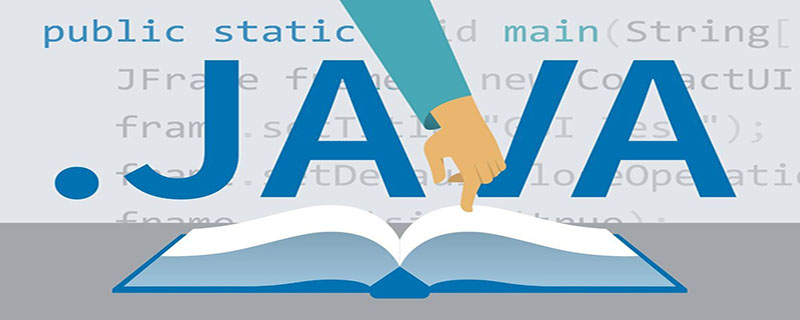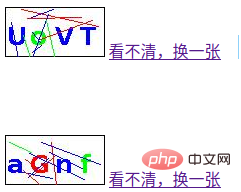Java implements dynamic picture verification code
Jan 09, 2020 pm 05:21 PM
Purpose:
Prevent malicious form registration
Generate verification code image
1. Define width and height
int width = 100; int height = 50;
2. Use BufferedImage to generate images in memory
BufferedImage image = new BufferedImage(width, height, BufferedImage.TYPE_INT_RGB);
3. Draw background and borders
Graphics g = image.getGraphics(); g.setColor(Color.WHITE); g.fillRect(0, 0, width, height); g.setColor(Color.BLACK); g.drawRect(0, 0, width - 1, height - 1);
(Free learning video tutorial sharing: java video tutorial)
4. Create a random character set and random number object
//字符集 String str = "ABCDEFGHIJKLMNOPQRSTUVWXYZabcdefgjijklmnopqrstuvwxyz"; //隨機數 Random ran = new Random();
5. Create a random color generation method
private Color getRandomColor(Random random) {
//獲取隨機顏色
int colorIndex = random.nextInt(3);
switch (colorIndex) {
case 0:
return Color.BLUE;
case 1:
return Color.GREEN;
case 2:
return Color.RED;
case 3:
return Color.YELLOW;
default:
return Color.MAGENTA;
}
}6. Draw Verification code characters
//繪制驗證碼
for (int i = 0; i < 4; i++) {
//獲取隨機字符
int index = ran.nextInt(str.length());
char ch = str.charAt(index);
//獲取隨機色
Color randomColor = getRandomColor(ran);
g.setColor(randomColor);
//設置字體
Font font = new Font("宋體", Font.BOLD, height / 2);
g.setFont(font);
//寫入驗證碼
g.drawString(ch + "", (i == 0) ? width / 4 * i + 2 : width / 4 * i, height - height / 4);
}7, draw interference lines
//干擾線
for (int i = 0; i < 10; i++) {
int x1 = ran.nextInt(width);
int x2 = ran.nextInt(width);
int y1 = ran.nextInt(height);
int y2 = ran.nextInt(height);
Color randomColor = getRandomColor(ran);
g.setColor(randomColor);
g.drawLine(x1, x2, y1, y2);
}8, use ImageIO to output pictures
ImageIO.write(image, "jpg", resp.getOutputStream());

to achieve refresh effect
1. Create a new html page
2. Use the img tag to display images
<img src="/static/imghw/default1.png" data-src="identcode" class="lazy" id="identcode" alt="Java implements dynamic picture verification code" > <a id="refesh" href="">看不清,換一張</a>
3. Use js to achieve the refresh effect
//點擊圖片時
var img = document.getElementById("identcode");
img.onclick = function (){
refesh();
}
//點擊連接時
var a = document.getElementById("refesh");
a.onclick = function (){
refesh();
//返回false防止a標簽默認href行為
return false;
}
function refesh() {
/**
* 由于路徑相同時瀏覽器會自動調用緩存中的圖片
* 所以在連接后加時間戳解決此問題
*/
var date = new Date().getTime();
img.src = "identcode?" + date;
}Finally Rendering:

Recommended related articles and tutorials: java introductory tutorial
The above is the detailed content of Java implements dynamic picture verification code. For more information, please follow other related articles on the PHP Chinese website!

Hot AI Tools

Undress AI Tool
Undress images for free

Undresser.AI Undress
AI-powered app for creating realistic nude photos

AI Clothes Remover
Online AI tool for removing clothes from photos.

Clothoff.io
AI clothes remover

Video Face Swap
Swap faces in any video effortlessly with our completely free AI face swap tool!

Hot Article

Hot Tools

Notepad++7.3.1
Easy-to-use and free code editor

SublimeText3 Chinese version
Chinese version, very easy to use

Zend Studio 13.0.1
Powerful PHP integrated development environment

Dreamweaver CS6
Visual web development tools

SublimeText3 Mac version
God-level code editing software (SublimeText3)
 How to handle transactions in Java with JDBC?
Aug 02, 2025 pm 12:29 PM
How to handle transactions in Java with JDBC?
Aug 02, 2025 pm 12:29 PM
To correctly handle JDBC transactions, you must first turn off the automatic commit mode, then perform multiple operations, and finally commit or rollback according to the results; 1. Call conn.setAutoCommit(false) to start the transaction; 2. Execute multiple SQL operations, such as INSERT and UPDATE; 3. Call conn.commit() if all operations are successful, and call conn.rollback() if an exception occurs to ensure data consistency; at the same time, try-with-resources should be used to manage resources, properly handle exceptions and close connections to avoid connection leakage; in addition, it is recommended to use connection pools and set save points to achieve partial rollback, and keep transactions as short as possible to improve performance.
 Understanding the Java Virtual Machine (JVM) Internals
Aug 01, 2025 am 06:31 AM
Understanding the Java Virtual Machine (JVM) Internals
Aug 01, 2025 am 06:31 AM
TheJVMenablesJava’s"writeonce,runanywhere"capabilitybyexecutingbytecodethroughfourmaincomponents:1.TheClassLoaderSubsystemloads,links,andinitializes.classfilesusingbootstrap,extension,andapplicationclassloaders,ensuringsecureandlazyclassloa
 How to work with Calendar in Java?
Aug 02, 2025 am 02:38 AM
How to work with Calendar in Java?
Aug 02, 2025 am 02:38 AM
Use classes in the java.time package to replace the old Date and Calendar classes; 2. Get the current date and time through LocalDate, LocalDateTime and LocalTime; 3. Create a specific date and time using the of() method; 4. Use the plus/minus method to immutably increase and decrease the time; 5. Use ZonedDateTime and ZoneId to process the time zone; 6. Format and parse date strings through DateTimeFormatter; 7. Use Instant to be compatible with the old date types when necessary; date processing in modern Java should give priority to using java.timeAPI, which provides clear, immutable and linear
 Comparing Java Frameworks: Spring Boot vs Quarkus vs Micronaut
Aug 04, 2025 pm 12:48 PM
Comparing Java Frameworks: Spring Boot vs Quarkus vs Micronaut
Aug 04, 2025 pm 12:48 PM
Pre-formanceTartuptimeMoryusage, Quarkusandmicronautleadduetocompile-Timeprocessingandgraalvsupport, Withquarkusoftenperforminglightbetterine ServerLess scenarios.2.Thyvelopecosyste,
 Understanding Network Ports and Firewalls
Aug 01, 2025 am 06:40 AM
Understanding Network Ports and Firewalls
Aug 01, 2025 am 06:40 AM
Networkportsandfirewallsworktogethertoenablecommunicationwhileensuringsecurity.1.Networkportsarevirtualendpointsnumbered0–65535,withwell-knownportslike80(HTTP),443(HTTPS),22(SSH),and25(SMTP)identifyingspecificservices.2.PortsoperateoverTCP(reliable,c
 How does garbage collection work in Java?
Aug 02, 2025 pm 01:55 PM
How does garbage collection work in Java?
Aug 02, 2025 pm 01:55 PM
Java's garbage collection (GC) is a mechanism that automatically manages memory, which reduces the risk of memory leakage by reclaiming unreachable objects. 1.GC judges the accessibility of the object from the root object (such as stack variables, active threads, static fields, etc.), and unreachable objects are marked as garbage. 2. Based on the mark-clearing algorithm, mark all reachable objects and clear unmarked objects. 3. Adopt a generational collection strategy: the new generation (Eden, S0, S1) frequently executes MinorGC; the elderly performs less but takes longer to perform MajorGC; Metaspace stores class metadata. 4. JVM provides a variety of GC devices: SerialGC is suitable for small applications; ParallelGC improves throughput; CMS reduces
 Comparing Java Build Tools: Maven vs. Gradle
Aug 03, 2025 pm 01:36 PM
Comparing Java Build Tools: Maven vs. Gradle
Aug 03, 2025 pm 01:36 PM
Gradleisthebetterchoiceformostnewprojectsduetoitssuperiorflexibility,performance,andmoderntoolingsupport.1.Gradle’sGroovy/KotlinDSLismoreconciseandexpressivethanMaven’sverboseXML.2.GradleoutperformsMaveninbuildspeedwithincrementalcompilation,buildcac
 go by example defer statement explained
Aug 02, 2025 am 06:26 AM
go by example defer statement explained
Aug 02, 2025 am 06:26 AM
defer is used to perform specified operations before the function returns, such as cleaning resources; parameters are evaluated immediately when defer, and the functions are executed in the order of last-in-first-out (LIFO); 1. Multiple defers are executed in reverse order of declarations; 2. Commonly used for secure cleaning such as file closing; 3. The named return value can be modified; 4. It will be executed even if panic occurs, suitable for recovery; 5. Avoid abuse of defer in loops to prevent resource leakage; correct use can improve code security and readability.






